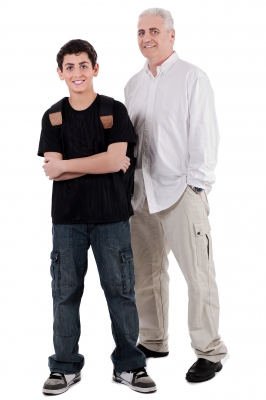
Teens have to recover from their parents’ addictions too.
Image courtesy of photostock / FreeDigitalPhotos.net
For teenagers who have had parents addicted to drugs or alcohol, life has been harder. It’s overwhelming and can be really unpredictable. Excessive drug and alcohol use make it hard for a parent to be fully present and available to their child. They are often parents who are filled with the best of intentions, but are very easily side-tracked by their need to drink, party or use a drug.
If you are a parent who has struggled with addiction, but are now recovering, you might wonder how your teen is supposed to heal from this too. You are astute enough to realize your adolescent does have some healing to do because you understand addiction actually never occurs in isolation, even if it is one of the most isolating struggles a person can face. You know it has affected your children. So what happens next?
I will base my answer on families I have worked with in the past who have dealt with this. This answer is predicated on the assumption that you are truly serious about your sobriety. It assumes you are not continuing to lie to yourself and your family (i.e. you no longer drink alcohol but you take a Xanax every single night in order to fall asleep).
The families I have seen where the addicted parent(s) truly change see a lag time in their teen’s adjustment. Their children have spent years learning to help the family hold it together. They have had times when they’ve gotten themselves to school. They have lied to other adults in order to avoid scrutiny for why they didn’t get their homework done, or were late to practice, or why Mom is not at such and such an event she was supposed to attend. They have possibly driven Dad home from a bar or a party. There has been a need for your child to create a self-sufficiency that is unnatural for their age. They are used to functioning this way, and they don’t immediately trust you enough to let their walls down.
What I have noticed is with consistency and honesty most of these kids do let their parents be parents again. It takes a lot of time, and some amount of struggle. However, deep down all they’ve wanted is for you to be be their safe home base. Now that you’re capable of being that, they are wary. However, if you are extremely patient and kind you will make headway. Help them to know you understand where you’ve fallen short. Don’t be afraid to apologize. Ask a lot of questions about how they’re feeling, but never tell them how they should be feeling.
You will have times where you sense your teenager trying to almost recreate some dysfunction in your relationship. Perhaps your son is now acting out, or your daughter is also experimenting with substances. Your child doesn’t know how to live without a certain amount of chaos. It takes quite a bit of time to detox from constant crisis. Create enough structure where your teenager is forced to forego a chaotic life, but expect them to seek it out for a time.
Most of all, remember your child loves you, and you love them too. Express this often, and be humble.
Helping teens grow and families improve connection,
Lauren Goodman, MS, MFT



